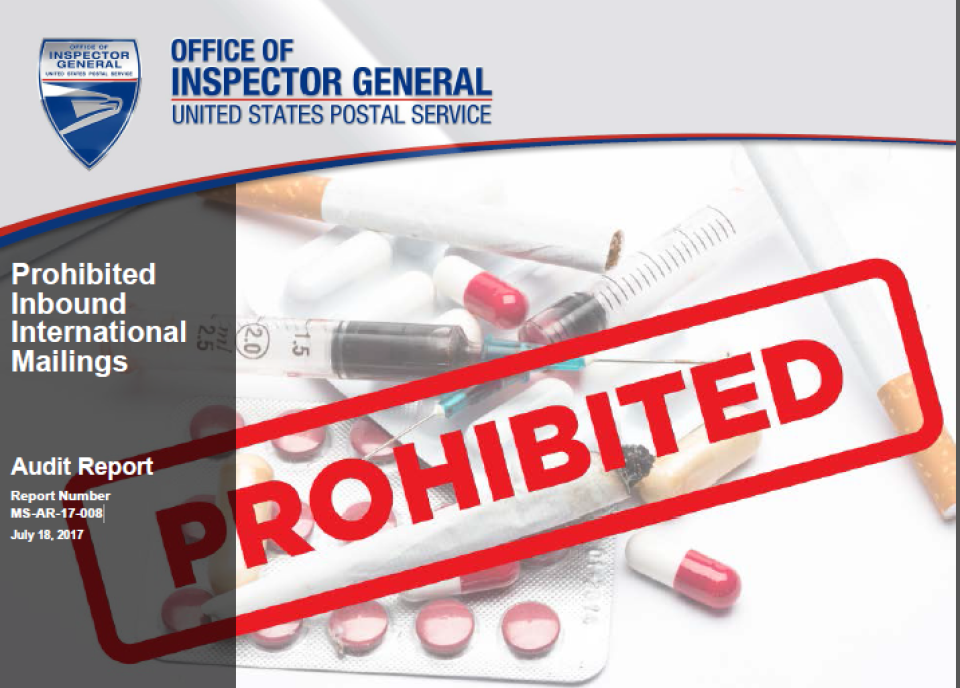Prohibited Inbound International Mailings
Background
Inbound international mail originates in foreign countries for delivery in the U.S. This mail typically arrives at one of the five U.S. Postal Service International Service Centers (ISC), the Honolulu Processing and Distribution Center, or the New Jersey International Network Distribution Center. In fiscal year (FY) 2016, the Postal Service recorded inbound international mail volume of about 621 million pieces, [redacted] million of which were packages, including ePackets. The Postal Service recorded total inbound international mail revenue of $821 million during that time.
With limited exceptions, all inbound international mail is subject to inspection by U.S. Customs and Border Protection (CBP) and [redacted].
CBP inspects these mailings to ensure compliance with federal laws and related federal regulations and policies. For mailings that would fall under CBP’s jurisdiction and that it confirms as being prohibited – such as threats to national security, illegal narcotics, or synthetic drugs – CBP manages the resulting handling of these items. This specific handling could entail seizure, destruction, or held for prosecution.
For other suspicious mailings like cigarettes, prescription drugs, or controlled substances that would fall under the jurisdiction of other federal agencies – such as the U.S. Food and Drug Administration (FDA) or the Postal Service – CBP may detain these items pending review by the respective agency, which may then advise, as appropriate, if the items should be removed from the domestic mailstream and how they should be handled. The Universal Postal Union maintains a list of prohibited inbound mailings for its member countries (which includes the U.S.).
The Postal Service plays a central role in this overall process by routing the mail to CBP for review and by (a) establishing “nonmailability” standards that apply to its customers; (b) coordinating with CBP, other federal agencies, and the Postal Inspection Service; (c) handling CBP-cleared mailings that are redeposited back into the mailstream; and (d) returning nonmailable items to international senders.
Our objective was to evaluate the Postal Service’s processes for handling prohibited inbound international mailings such as cigarettes and prescription drugs.
What the OIG Found
The Postal Service needs to improve its processes for handling prohibited inbound international mailings. We determined the Postal Service returned at least 54,126 prohibited packages to international senders between FY 2014 and FY 2016. Note that these reflect only barcoded items such as Express Mail Service and Parcel Post.
The Postal Service returns these items because related laws, regulations, and policies are ambiguous and open to interpretation – particularly those related to how these items should be handled. Postal Service officials believe that returning these items is the most cost effective method of disposal, although they have not conducted a formal cost analysis. Furthermore, there are no formal agreements between the Postal Service, CBP, and other federal agencies describing the Postal Service’s responsibilities for handling prohibited items. In addition, the Postal Service’s policies in this area are relatively vague, particularly related to coordinating with foreign postal operators when significant numbers of these types of mailings are coming from their respective countries.
Returning these prohibited international mailings may not sufficiently deter mailers from trying to send prohibited items into the U.S. – a condition that could negatively impact the Postal Service’s brand and image and could increase the risk that the items will re-enter the mailstream without detection.
We also determined that the Postal Service is storing about 25 bulk mail containers of prescription drugs at the [redacted] ISC because of disagreements with the FDA about how to handle these packages. FDA staff told the Postal Service that the packages contained prescription drugs that appear to violate the Federal Food, Drug, and Cosmetic Act. Postal Service officials stated that the Postal Service is prohibited from knowingly returning items that are banned from entering the U.S. These prescription drugs will remain a safety and security risk at the ISC until a permanent resolution is reached.
In related matters, our recent December 2016 report recommended the Postal Service, CBP, and other stakeholders advocate requiring additional advance electronic mailing data (such as name, address, and item content) to assist inspection and processing efforts. When implemented, corrective action should help enhance the Postal Service’s and CBP’s ability to identify and potentially prevent prohibited items.
What the OIG Recommended
We recommended management:
- Work with Congress and key stakeholders to clarify legal provisions related to handling prohibited mailings, agency responsibilities, and costs allocation;
- Clarify policies for handling prohibited items;
- Conduct a formal cost analysis comparing various disposal options for the Postal Service’s handling of prohibited mailings and determine which is the most cost effective;
- Coordinate with CBP to establish a memorandum of understanding describing the Postal Service’s responsibilities for handling prohibited mailings;
- Develop procedures for coordinating with foreign postal operators when significant amounts of prohibited inbound mailings from those countries are identified; and,
- Continue to coordinate with the FDA and the Postal Inspection Service to find a permanent resolution for removing the prescription drugs currently stored at the [redacted] ISC.

